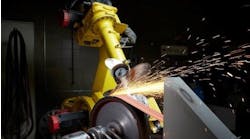Amazon's Delivery-Drone Research Focuses on Avoiding Birds
Amazon.com Inc.’s development of package-delivery drones is progressing to the point where the company is now thinking a lot about geese.
The e-commerce company said Thursday it has started development of an air-traffic control system to manage its fleet as the drones fly from warehouses to customers’ doors. Amazon created a new research and development team near Paris, where about a dozen software engineers and developers will build a system aimed at ensuring flying delivery vehicles don’t collide with buildings, trees, other drones and -- most unpredictable of all -- birds. Or, to use aviation industry jargon, “non-collaborative flying objects.”
“Geese will never be collaborative so we have to sense and avoid those obstacles,” said Paul Misener, Amazon’s vice president for global innovation policy and communications. “Going from a warehouse to a customer’s location, a drone has to fly in the right direction, find it, but also avoid all the things along the way.”
Amazon decided to build its own traffic-control system after concluding what’s available isn’t adequate for a large fleet of autonomous drones. The company has hired engineers with expertise in aviation as well as machine learning and artificial intelligence. Misener said France was selected because of the availability of talented engineers interested in this area of aviation. The country has a rich history in mathematics education and companies including Facebook Inc., Google and General Electric Co. have also set up research facilities in Paris.
Unlike an air-traffic control system used by airlines, Misener said a program for drones is more complicated because the vehicles fly at lower heights and must account for more obstacles. The management system will integrate detailed maps -- including temporary objects such as construction cranes -- as well as information about bad weather conditions. Drones will be programmed with instructions on how to react if they come near -- or strike -- a bird.
However, similar to systems used by airlines, Amazon said the software it was developing will be loaded onto the drones themselves to allow the vehicles to communicate risks in real-time with each other, as well as a central control center.
In an interview at Amazon’s French headquarters in the Paris suburb of Clichy, Misener didn’t give a timeline for when drones will be widely available for Amazon customers. He said it will depend largely on government regulations and the company’s ability to prove it’s safe. "This is highly regulated," he said. "We’re not going to launch this until we can demonstrate its safety."
In the U.S., the Federal Aviation Administration released rules last year that restricts drone flights over densely populated areas. If those rules hold, it would mean Amazon’s service would be restricted to more rural areas. Misener said regulations would likely mean some areas will get drone deliveries before others.
Amazon Chief Executive Officer Jeff Bezos first announced the company’s drone plans in 2013 as a way to deliver certain items to customers within 30 minutes. Misener gives the example of a guy realizing he’s out of toothpaste before a date. Amazon has said about 85% of the products on its website are light enough to be delivered by drone. When making a delivery, Amazon has proposed the vehicles will fly at heights between 200 feet and 400 feet, equivalent to being higher than an eight-story building. The drones, which will operate autonomously without a pilot, will fly at speeds up to 50 miles per hour.
Amazon is conducting drone research in the U.K., Austria and the U.S. In Cambridge, about 60 miles from London, the company has been testing deliveries. France was one of the first countries to regulate commercial drone use in 2012, a move that’s supported the growth of local companies from toy-aircraft maker Parrot SA to Delair-Tech, a maker of flying devices for farming to mining.
In addition to building tools for managing its own drone fleet, Amazon said it has also been working with the U.S. National Aeronautics and Space Administration, European Union and other countries to develop a broader traffic system for coordinating all drone flights in the air. "Managing the air traffic control for big air crafts up at high altitudes is very different from this," Misener said.
Beyond government regulation, one of Amazon’s most difficult jobs will be winning over people wary of package-carrying drones flying over head. "We aren’t unaware," he says, "that society has to accept this."
By Adam Satariano and Marie Mawad




